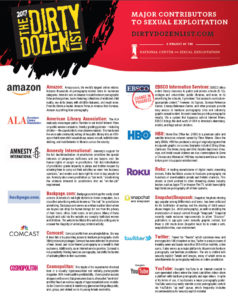NCOSE Names Mainstream Companies and Groups Facilitating Sexual Exploitation
The National Center on Sexual Exploitation announced its 2017 Dirty Dozen List today, naming twelve major contributors to sexual exploitation. NCOSE also announced a victory regarding Verizon.
Why the Dirty Dozen List is Important
No corporation or organization should profit from or facilitate sexual exploitation.
That’s why we started The Dirty Dozen List — an annual project that names twelve mainstream entities that are major contributors to sexual exploitation. The disturbing truth is that many well-established brands, companies, and organizations in America are major perpetrators of sexual harm — whether that be through pornography, prostitution, or sex trafficking.
We live in an age wher e many consumers demand transparency from companies they trust. We want to know the working conditions of those who made our clothing, and if pesticides were used to grow our food. Now, thanks to The Dirty Dozen List, we can see which well-known entities promote and profit from forms of sexual exploitation. Even better, The Dirty Dozen List gives individuals the ability to make a difference. For each company or institution on the list, there are direct actions NCOSE makes available. From signing petitions to emailing executives, the Dirty Dozen List empowers individuals to take action and to promote a marketplace that respects human
e many consumers demand transparency from companies they trust. We want to know the working conditions of those who made our clothing, and if pesticides were used to grow our food. Now, thanks to The Dirty Dozen List, we can see which well-known entities promote and profit from forms of sexual exploitation. Even better, The Dirty Dozen List gives individuals the ability to make a difference. For each company or institution on the list, there are direct actions NCOSE makes available. From signing petitions to emailing executives, the Dirty Dozen List empowers individuals to take action and to promote a marketplace that respects human
dignity.
Verizon Policy Change Victory
Verizon, a previous member of the Dirty Dozen List, has been removed following a policy change that symbolizes important progress in the technology, media and telecommunications industry’s approach to pornography.
Verizon CEO Lowell McAdam has informed NCOSE that beginning in early 2017 the display of pornography for new customers of FiOS IPTV will be automatically disabled. In other words, new FiOS IPTV customers must opt-in to view pornography, rather than those who do not want such material having to opt-out. This is significant because new Verizon customers will no longer be bombarded with hardcore pornography channels that objectify women and men and that often feature themes of abuse, incest, and misogyny.
While Verizon continues to profit from the distribution and sale of pornography, we are grateful to see its leadership adopt a positive change which is why we have removed Verizon from the 2017 Dirty Dozen List and instead placed it on the Watch List. The Watch List tracks potential contenders for future Dirty Dozen Lists depending on their follow through on commitments and next actions.
New Additions to the 2017 Dirty Dozen List
This year’s list has four new additions, including Roku, a popular digital media player company that hosts private pornography channels. Comcast is listed because it not only directly sells pornography via its Xfinity TV, but it also has actively defended selling pornography with violent, racist, and sexist themes. Twitter was placed on the 2017 Dirty Dozen List for its failure to filter and actively dismantle the prostitution and pornography accounts on its platform.
Most disturbing of all, we have found that EBSCO Information Services, an online library resource company for schools K-12, and up, is intermixing links to hardcore pornography and other graphic sexual material with innocent educational resources accessed by school children. Currently, EBSCO’s website promises schools that the content is filtered to be curriculum-appropriate. However, while the program filters to keep large or complex words out of younger demographics’ search results, it fails to stop sexually explicit material from being published as an “educational” resource — including links to torture porn sites, and instructions for how young boys can pressure girls into trying violent, anal, or group sex.
While this is one of the greatest scandals ever covered by the National Center on Sexual Exploitation’s Dirty Dozen List we are hopeful that it could become one of the greatest examples of a corporation intentionally changing policies to protect individuals from sexually exploitive content. EBSCO officials called NCOSE last night and explained that they are taking measures to improve and that they desire to be on the side of curbing sexual exploitation. NCOSE looks forward to collaborating on these improvements.
Past Dirty Dozen List victories include policy changes at Google, Hilton Worldwide, the Department of Defense, Walmart, and more.
The 2017 Dirty Dozen List: DirtyDozenList.com

Amazon: Amazon.com, the world’s largest online retailer, features thousands of pornography-related items in numerous categories. Items for sale on Amazon include hardcore pornographic films and magazines, books featuring collections of eroticized child nudity, sex dolls (many with childlike features), and more. From its Kindle e-reader, Amazon Prime, to Amazon Web Services, Amazon is profiting from pornography.
American Library Association (ALA): The ALA zealously encourages public libraries to not install Internet filters on public-access computers, thereby granting patrons — including children — the opportunity to view obscene material. This has turned the once safe community setting of the public library into an XXX-space that fosters child sexual abuse, sexual assault, exhibitionism, stalking, and lewd behavior in libraries across the country.
Amnesty International: Amnesty’s support for the full decriminalization of prostitution prioritizes the special interests of pimps/sex traffickers and sex buyers over the human rights of people in prostitution. Full decriminalization of prostitution grants impunity to pimps and brothel-keepers by allowing them to carry out their activities as mere “sex business operators,” and creates a de facto right for men to buy people for sex. Amnesty also views prostitution as “sex work,” transforming the violence inherent to prostitution into an “on-the-job” requirement.
Backpage.com: Backpage.com brings the seedy street corners of America’s red-light districts to home computers. As a classified advertising website known as “the hub” for prostitution advertising, Backpage.com serves as a virtual auction block where sex buyers can shop for human beings for sex from the privacy of their home, office, hotel room, or cell phone. Many of those bought and sold via the website are sexually trafficked women and children. The website facilitates this activity by editing ads to conceal the illegality of underlying criminal activity.
Comcast: Comcast profits from sexual exploitation. One way it does this is by providing access to hardcore pornography via its Xfinity television packages. Comcast has even defended its provision of teen, incest, and racist-themed pornography as a benefit to their customers. Additionally, as an Internet service provider, Comcast is not proactively filtering hardcore pornography, but shifts the burden of activating filters to their customers.
Cosmopolitan: This staple of the supermarket checkout lane is a visually hyper-sexualized and verbally pornographic magazine. With inexhaustible predictability, Cosmopolitan accosts shoppers with covers that pronounce dozens of recycled “sex tricks” and flaunts an endless supply of hypersexualized cover models. As for Cosmo’s content, it relentlessly glamorizes things like public, anal, group, and violent sex to its young female readership.
EBSCO Information Services: EBSCO offers online library resources to public and private schools (K-12), colleges and universities, public libraries, and more. In its advertising for schools, it promises “fast access to curriculum-appropriate content.” However, its Explora, Science Reference Center, Literary Reference Center, and other products, provide easy access to hardcore pornography sites and extremely graphic sexual content. Innocent searches provide pornographic results. Via a system that bypasses school Internet filters, EBSCO brings the dark world of XXX to America’s elementary, middle, and high school children.
HBO: Home Box Office Inc. (HBO) is a premium cable and satellite television network owned by Time Warner. Since the early 2000s, HBO has produced a string of original programs that incorporate graphic sex scenes. Examples include G String Divas, CatHouse: The Series, Hung, and Girls. Graphic depictions of sex, rape, and brutal sexual violence are also commonplace in Game of Thrones and Westworld. HBO has reached a new low as it turns torture porn into popular entertainment.
Roku: A leading manufacturer of digital media streaming devices, Roku profits from and facilitates access to hardcore pornography via hundreds of downloadable private and hidden channels. This stands in stark contrast to other streaming device industry leaders such as Apple TV or Amazon Fire TV, which have rightly kept hardcore pornography off of their systems.
Snapchat and Snapcash: Snapchat, the photo-sharing app popular among Millennials and teens, has been criticized for its facilitation of sexting and the sharing of child sexual abuse images (i.e. child pornography,) as well as enabling the monetization of sexual content through “Snapcash.” Snapchat recently made welcome improvements to allow “Discover” publishers to age-gate some sexually graphic content, but there is still much more Snapchat must do to create a safe, sexploitation-free, user environment.
Twitter: Famed for “Tweets” which condense news and messages into 140 characters or less, Twitter is a major source of breaking news and boasts more than 300 million monthly, active users. It also serves as a major platform to disseminate hardcore pornography and facilitate prostitution. The site is riddled with sexually explicit Tweets and images, many of which serve as advertisements for pornography websites or online prostitution.
YouTube: Google’s YouTube is an Internet conduit to user-generated videos where the latest cute kitten videos share a platform with hardcore pornography and rape videos. In spite of its terms of use, it has become a major pornography portal. YouTube users may easily stumble across pornographic content via YouTube’s “up next” queue, which frequently included recommendations for sexually explicit material.


